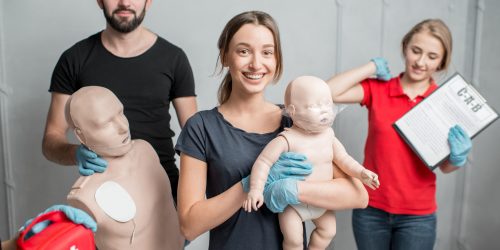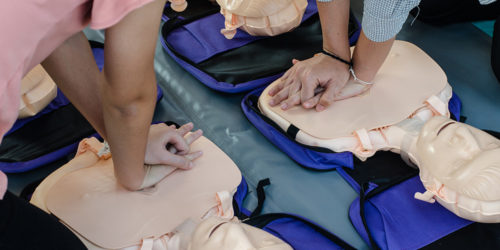First Aid is a common term not commonly understood. Why so? For any number of reasons, most likely because unless you’re in a field where it’s a necessity, most people just don’t think about it. Ignorance is not bliss, especially where illness or injury are concerned.
Have you ever been in need during a time of pain or sickness? During that time did you wish there was someone who could help? That’s where knowing first aid comes in. If dwelling on your own past discomforts isn’t enough, below are 12 reasons to ignore first aid no more.
1. Common Household Injuries
Cuts. Burns. Upset stomach. Nausea. Sprain. Back pain. Choking. Bites or stings. Headache. Fever. All these are common occurrences for first aid. Recognizing any of these is important, but how to respond with treatment is even better. The sooner a response with treatment can be made to many illnesses or injuries, the better. With many an activity that could go wrong resulting in injury, and with viruses and bacteria on many a surface, ignoring first aid would be a disservice to the health of ourself and those around you on the daily.
2. Practice Makes Permanent
Ever heard the phrase, “know before you go?” It is commonly used for sharing helpful information needed ahead of an event. First aid needs don’t exactly advertise a day and time of occurrence, so it’s best to know before it happens. After all, when illness or injury strikes, it’s better to have an existing understanding than try to figure it out under pressure. Learning first aid allows the information to settle in and become resolute. When going through the day to day, it is good practice to imagine the need for a first aid response and run through the steps. Having mental practice will improve and smooth the response when needed.
3. Fight, Flight, Freeze
When a challenge is posed, responses can often be categorized into three common reactions. Fight, flight, or freeze. Fight indicates an engaged response to handle the situation, while flight is the response to retreat from the situation. Freeze is a reaction where no action is taken. Different people and personalities could respond with any option of fight, flight or freeze. When it comes to first aid needs, action is the best reaction. Fighting the ailment will increase the chances for full recovery.
4. Expect the Unexpected
With practice and a ready-to-respond outlook, time to expand on that knowledge base. Various environments and activities can pose different threats to health and safety. As activities and surroundings change (going hiking, a cooking class, new job, etc) best to research some newly relevant uses for first aid. It may not have been necessary to prepare for certain bug bites or know what plants are poisonous, but if relocating to an area with new varieties of plants and animals, it doesn’t hurt to know. Plan ahead, widen the scope of first aid methods, and expect the unexpected. Foresight such as this can improve the timeliness and appropriateness of the response if the situation arises.
5. Tools On Hand
Know the feeling when you need something desperately and just can’t find it? Probably not the ideal situation when someone is sick or injured and needs help. With a basic knowledge of first aid and common illnesses and injuries, can help with preparedness. Basic first aid items such as bandages, pain medication, fever medication, antibacterial ointment and burn cream are just a few simple handy things to have around.
6. It Can Happen To You
Injury and illness know no bounds of person or place.
7. No One Intends To Get Hurt Or Sick
Have you ever just sat there and had the thought, “I think I’ll get sick today?” Okay, maybe it was a contemplative thought in order to avoid work or school (not recommended). In reality no one truly craves or tries to be sick or injured. It happens to anyone, anywhere. Illness and injury do not discriminate against anyone so it’s best to be prepared.
Whether it’s you or someone close to you (physically or emotionally), odds are someone will have an illness or injury requiring some form of first aid. Responding to these situations is best with some forethought and knowledge of helpful first aid practices in order to actually improve the situation and not be the one who makes it worse.
8. Can’t Make It Worse, and Don’t Want To
Speaking of worse, where there’s a problem, the for anyone is usually to see the situation improved. By giving proper consideration to first aid uses and methods, you’re already off to a good start to not make it worse. No one wants to make a situation worse than it already is. Fear of worsening a situation often comes from ignorance; using improper tools or medication. Having a respectful approach and knowledge of first aid, bolsters the successful use of it, and can improve recovery for the patient.
9. Good Samaritan
We all like to think we will be the hero to rise to the occasion of helping another if needed. Realistically, some reasonings could hold us back. One factor is fear of liability. Luckily, the majority of states provide protection under some type of good Samaritan law. These laws essentially grant immunity of liability to the good Samaritan who intends to aid a victim in good faith.
10. Culture of Safety
First aid should be a more widely understood and practiced topic. Safety and wellness are fundamental values. By having an active perception in communities, groups, workplaces, schools, etc to protect and preserve health and safe practices, it can create a culture of safety. With a culture of safety established, quality of life can be safeguarded, and even improved.
11. Golden Rule
Treat others how you’d want to be treated. Keyword there is treat. Languishing in illness or injury is not what anyone wants for themselves. Knowing first aid can enable you to be the helping hand for another during their time of pain or sickness, especially if they can’t help themselves. You’d want the same response too. No matter the circumstance for first aid, the use of it is the best medicine.
References:
Want to learn more about First Aid?
Check out our online First Aid and CPR Certification classes. You can also obtain your First Aid and/or CPR certification!




